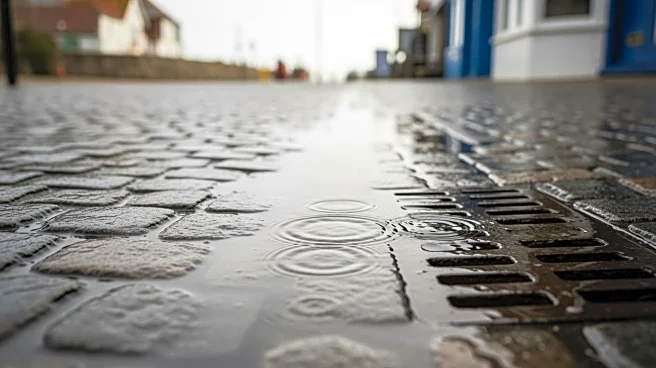What's Happening?
Toni Dawson, the owner of Geraldo's, a seaside town shop in Largs, is facing potential closure due to persistent flooding issues. These problems began after a nearby storm drain was covered in tarmac during
road resurfacing work by Amey in late 2021. The shop, which sells artisan ice cream, chocolates, and gifts, has been a fixture in the community for about 25 years. Despite improvements to sea wall defenses that initially resolved flooding issues, the resurfacing has led to water from the A78 road running directly into the shop during heavy downpours. Dawson has expressed her frustration and exhaustion over the situation, noting that the flooding has occurred three times in the past year without prior flood alerts or warnings.
Why It's Important?
The flooding issue at Geraldo's highlights the broader impact of infrastructure decisions on local businesses. The covering of storm drains during road resurfacing has created significant challenges for Dawson, threatening the viability of her long-standing business. This situation underscores the importance of considering environmental and community impacts in urban planning and maintenance projects. If unresolved, the flooding could lead to the closure of a local business, affecting the local economy and community fabric. The case also raises questions about accountability and responsiveness of road maintenance companies and local authorities in addressing such issues.
What's Next?
Amey, the road maintenance company responsible for the resurfacing, has stated that it is urgently seeking a solution to the flooding problem. Dawson has reached out to North Ayrshire Council, Amey, and Transport Scotland, expressing her desperation and the potential need to close her shop. The resolution of this issue will require collaboration between these entities to find a viable solution that prevents further flooding. The outcome could set a precedent for how similar infrastructure-related issues are handled in the future, potentially influencing policy and maintenance practices.
Beyond the Headlines
The situation at Geraldo's may prompt broader discussions on the ethical responsibilities of infrastructure companies and local governments in safeguarding businesses and communities from unintended consequences of development projects. It also highlights the need for more robust planning and risk assessment processes to prevent similar occurrences. Long-term, this could lead to changes in how infrastructure projects are evaluated and executed, with greater emphasis on environmental and community impact assessments.









